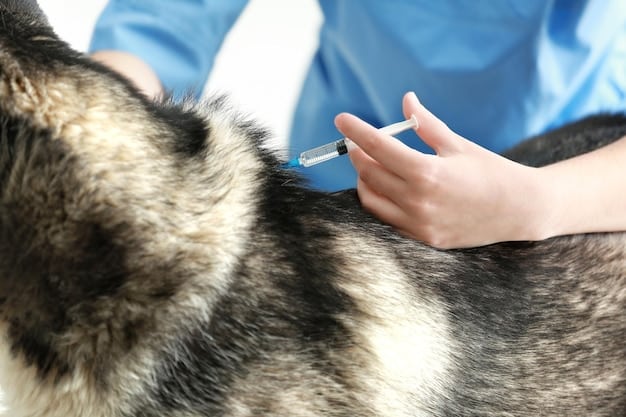Protect Your Pet: Lyme Disease Vaccine Updates for 2025

Anúncios
Protect your pet from Lyme disease in 2025 with the latest vaccine updates; explore preventative measures, understand vaccine efficacy, and consult with your vet for the best protection strategy.
Protecting your furry friends from diseases is a top priority for any pet owner. With the threat of Lyme disease looming, staying informed about the latest vaccine updates is crucial. This guide will walk you through everything you need to know to protect your pet from Lyme disease: Latest Vaccine Updates for 2025, ensuring they live a happy and healthy life.
Anúncios
Understanding Lyme Disease in Pets
Lyme disease is a bacterial infection transmitted through the bite of infected black-legged ticks. These ticks are commonly found in wooded and grassy areas, making pets that enjoy outdoor activities more susceptible. Knowing the risks and symptoms of Lyme disease can help you take proactive steps to safeguard your pet’s health.
How Lyme Disease Affects Pets
Lyme disease, caused by the bacterium Borrelia burgdorferi, can lead to a range of health issues in pets. While not all infected pets show symptoms, those that do may experience lameness, joint pain, fever, and lethargy. Severe cases can even result in kidney damage. Early detection and treatment are crucial to prevent long-term complications.
Anúncios
Common Symptoms of Lyme Disease in Pets
Recognizing the symptoms of Lyme disease is vital for early intervention. Keep an eye out for the following signs:
- Lameness: Shifting lameness that affects different legs
- Joint Pain: Noticeable pain or stiffness in the joints
- Fever: Elevated body temperature
- Lethargy: Unusual tiredness or lack of energy
- Swollen Lymph Nodes: Enlarged lymph nodes near the site of the tick bite
If you observe any of these symptoms, consult your veterinarian immediately. Prompt diagnosis and treatment can significantly improve your pet’s prognosis.
Ultimately, understanding the basics of Lyme disease is the first step in protecting your beloved pet. By staying informed and vigilant, you can ensure they remain healthy and active.
The Importance of Lyme Disease Vaccination
Vaccination is a key component of preventing Lyme disease in pets. Lyme disease vaccines work by stimulating your pet’s immune system to produce antibodies that fight the Borrelia burgdorferi bacterium. This proactive approach can significantly reduce the risk of infection and related health issues.

How the Lyme Vaccine Works
Lyme disease vaccines typically contain inactivated or modified versions of the Borrelia burgdorferi bacterium. When administered, the vaccine triggers the pet’s immune system to recognize and attack the bacterium if it ever enters their body. This process helps prevent the infection from taking hold and causing illness.
Benefits of Vaccinating Your Pet
Vaccinating your pet against Lyme disease offers several compelling benefits:
- Reduced Risk of Infection: Significantly lowers the chances of contracting Lyme disease
- Prevention of Clinical Signs: Minimizes the likelihood of developing symptoms like lameness and joint pain
- Protection Against Kidney Damage: Helps prevent severe complications like Lyme nephritis
- Peace of Mind: Provides assurance that you’re taking proactive steps to protect your pet’s health
Regular vaccination, combined with tick prevention strategies, is the best way to protect your pet from the risks associated with Lyme disease. Talk to your vet about incorporating the Lyme vaccine into your pet’s wellness plan.
In conclusion, understanding the importance and benefits of Lyme disease vaccination is crucial for responsible pet ownership. By proactively vaccinating your pet, you’re investing in their long-term health and well-being.
Latest Lyme Vaccine Updates for 2025
As we look ahead to 2025, staying current with the latest advancements in Lyme disease vaccines is essential. Recent developments focus on improving vaccine efficacy, broadening protection, and reducing potential side effects. Here’s what you need to know about the newest updates in Lyme disease vaccination.
New Vaccine Formulations
Researchers are constantly working to develop improved Lyme disease vaccine formulations. Some of the latest advancements include:
- Multi-Strain Vaccines: Vaccines that target multiple strains of the Borrelia burgdorferi bacterium, offering broader protection
- Adjuvant Enhancements: Improved adjuvants that boost the immune response, leading to greater vaccine efficacy
- Reduced Reaction Rates: Formulations designed to minimize potential injection site reactions or other side effects
Expert Recommendations
Veterinary experts recommend a comprehensive approach to Lyme disease prevention, including vaccination, tick control, and regular screening. Consult your veterinarian to determine the best strategy for your pet based on their lifestyle, risk factors, and geographic location.
Staying informed about the latest vaccine updates and expert recommendations will help you make the best decisions for your pet’s health. Keep in close contact with your vet to ensure your pet receives the most up-to-date protection available.
As we approach 2025, the new advancements emphasize the ongoing commitment to improving the safety and effectiveness of Lyme disease vaccines. By staying informed, you can better protect your pet from this growing threat.
Tick Prevention Strategies
While vaccination is a vital part of Lyme disease prevention, it’s equally important to implement effective tick prevention strategies. These strategies aim to reduce your pet’s exposure to ticks and minimize the risk of tick bites. Combining vaccination with tick prevention creates a comprehensive defense against Lyme disease.
Topical Tick Preventatives
Topical tick preventatives are applied directly to your pet’s skin and work by either repelling or killing ticks upon contact. These products come in various forms, including:
- Spot-On Treatments: Applied monthly to a specific area of the pet’s skin
- Tick Collars: Release a tick-killing or repelling substance over several months
- Sprays: Applied to the pet’s coat before outdoor activities
Oral Tick Preventatives
Oral tick preventatives are administered as a chewable tablet or pill and work systemically to kill ticks that bite your pet. These products are generally given monthly and can provide broad-spectrum protection against ticks and other parasites.

Ultimately, effective tick prevention involves a multi-faceted approach tailored to your pet’s specific needs. By combining topical and oral preventatives with environmental control measures, you can significantly reduce the risk of tick bites and Lyme disease.
Implementing robust tick prevention strategies is essential for protecting your pet from Lyme disease. By combining vaccination with proactive tick control measures such as topical and oral preventatives to minimize risk.
Understanding Vaccine Efficacy and Safety
When considering Lyme disease vaccination for your pet, it’s important to understand the vaccine’s efficacy and safety profile. Vaccine efficacy refers to how well the vaccine prevents infection under controlled conditions, while safety relates to the potential side effects or adverse reactions associated with vaccination.
Assessing Vaccine Efficacy
Lyme disease vaccines undergo rigorous testing to evaluate their efficacy. These studies typically involve vaccinating a group of pets and then exposing them to the Borrelia burgdorferi bacterium. The results are then compared to a control group that did not receive the vaccine.
A highly effective Lyme disease vaccine should demonstrate a significant reduction in infection rates and clinical signs of Lyme disease compared to the control group. However, it’s important to note that no vaccine is 100% effective, and some pets may still contract Lyme disease despite being vaccinated.
Potential Side Effects of Lyme Vaccine
While Lyme disease vaccines are generally considered safe, some pets may experience mild side effects following vaccination. These side effects are typically temporary and resolve on their own within a few days. Common side effects include:
- Injection Site Reactions: Redness, swelling, or tenderness at the injection site
- Lethargy: Mild fatigue or decreased activity level
- Fever: Slight elevation in body temperature
Overall, the benefits of Lyme disease vaccination generally outweigh the potential risks. However, it’s important to discuss any concerns you may have with your veterinarian before vaccinating your pet.
In summary, understanding the vaccine’s efficacy and safety is a critical step in making informed decisions about Lyme disease prevention for your pet. By carefully evaluating the available evidence and consulting with your vet, you can choose the approach that best suits your pet’s individual needs.
Consulting with Your Veterinarian
The most important resource for protecting your pet from Lyme disease is your veterinarian. They can provide personalized recommendations based on your pet’s lifestyle, risk factors, and geographic location. Regular check-ups and open communication with your vet are essential for developing a comprehensive Lyme disease prevention plan.
Discussing Vaccination Options
During your visit, discuss the available Lyme disease vaccine options with your veterinarian. They can explain the benefits and risks of each vaccine and help you determine which one is most appropriate for your pet. Consider factors such as:
- Vaccine Efficacy: How well the vaccine prevents Lyme disease
- Potential Side Effects: The likelihood and severity of any adverse reactions
- Your Pet’s Risk Factors: Your pet’s exposure to ticks based on their lifestyle and environment
Personalized Prevention Plans
Your veterinarian can also help you develop a personalized Lyme disease prevention plan that includes vaccination, tick control, and regular screening. This plan should be tailored to your pet’s specific needs and may involve:
- Tick Preventative Medications: Recommendations for topical or oral tick preventatives
- Environmental Control Measures: Tips for reducing tick habitats in your yard
- Regular Tick Checks: Instructions for performing thorough tick checks on your pet
By working closely with your veterinarian, you can create a customized Lyme disease prevention strategy that effectively protects your pet from this serious health threat. Remember, proactive prevention is key to keeping your furry friend happy and healthy.
In conclusion, consulting with your veterinarian is a crucial step in protecting your pet from Lyme disease. Their expertise and personalized guidance can help you make informed decisions and implement a comprehensive prevention plan.
| Key Point | Brief Description |
|---|---|
| 🛡️ Importance of Vaccination | Vaccination significantly reduces the risk of Lyme disease in pets. |
| 🌿 Tick Prevention | Use topical and oral preventatives to minimize tick exposure. |
| 💉 Latest Vaccine Updates | Stay informed about new formulations and expert recommendations. |
| 🐾 Consult Your Vet | Regular check-ups for personalized prevention plans. |
Frequently Asked Questions (FAQs)
▼
Lyme disease is a bacterial infection transmitted through tick bites, causing symptoms like lameness, joint pain, and fever in pets. Early detection and treatment are crucial.
▼
The Lyme vaccine stimulates your pet’s immune system to produce antibodies that fight the Lyme bacterium, preventing infection and reducing the risk of severe symptoms.
▼
Common side effects of the Lyme vaccine include mild injection site reactions, lethargy, and fever, which typically resolve within a few days.
▼
To prevent tick bites, use topical or oral tick preventatives, regularly check your pet for ticks, and minimize exposure to tick-prone environments.
▼
The vaccination schedule for Lyme disease varies, so consult with your veterinarian to determine the appropriate timing and frequency for your pet’s vaccinations.
Conclusion
Protecting your pet from Lyme disease requires a multi-faceted approach that includes staying informed about the latest vaccine updates, implementing effective tick prevention strategies, and consulting regularly with your veterinarian. By taking these proactive steps, you can ensure your furry friend remains healthy and happy for years to come.






